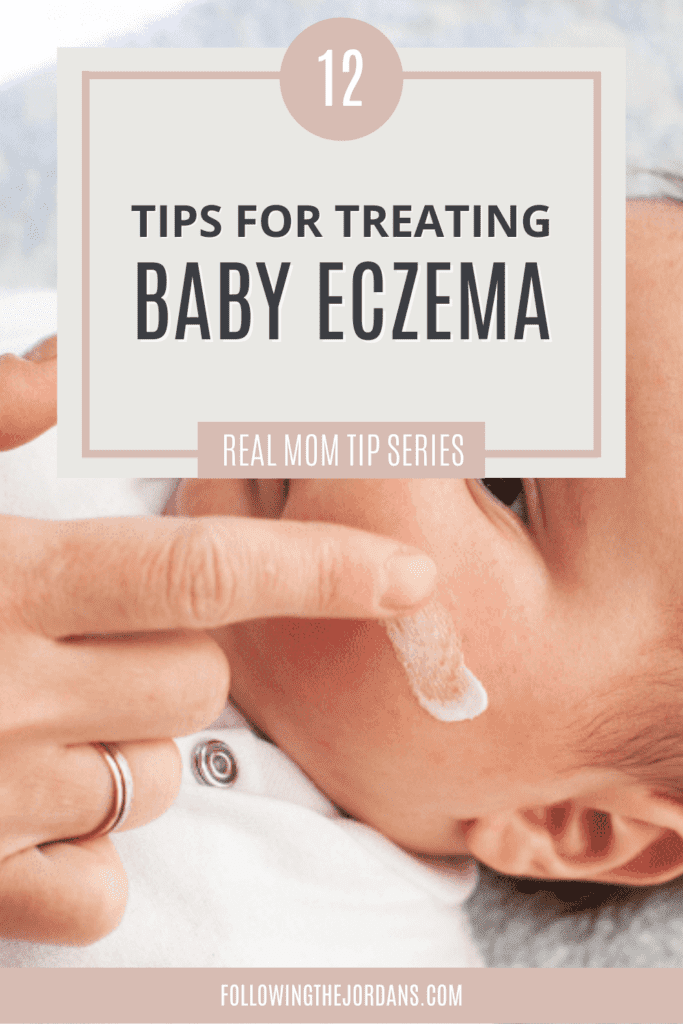Real Mom Tip Series: 12 Tips for Treating Baby Eczema
Eczema is one of the most common skin conditions in both adults and children. Some babies have mild eczema, but others struggle to sleep due to the discomfort. Figuring out the best route for treating baby eczema is important and individual; what works for one individual may not work for another.
Eczema affects around 9.6 million children in the United States, and each year, more children continue to suffer from this broad skin condition. This term is an umbrella term for skin that is dry, itchy, inflamed, and discolored.
The first thing parents need to do is talk to your baby’s doctor who can provide medications to tame the eczema and give you better control over it.
Then, you need to figure out what tips for treating baby eczema works for you. Here are some of the best options for your to try!
Pin this blog for later! ↓

Related: 51 Baby Registry Must-Haves You Need to Include
12 Tips for Treating Baby Eczema

1. Watch Your Diet
Eczema and food allergies typically go hand in hand; the most common allergies are gluten, cow’s milk, eggs, soy, nuts, and fish. Your child’s pediatrician can complete food allergy tests that let you know what your child’s specific allergies.
Another option is to go through an elimination diet to gauge how your baby’s reaction to certain foods. Remove potential triggers from your baby’s diet or your diet if you’re breastfeeding, and then reintroduce one at a time to see if your baby’s skin flares up.
2. Manage Environmental Eczema Triggers
Another important tip when treating baby eczema is to manage environmental eczema triggers; more than food allergies will trigger flare ups. It takes time to figure out what bothers your child’s eczema, but here are some potential triggers.
- Soaps
- Detergents
- Pollen
- Dust
- Pet fur & dander
- Wool
- Synthetic fabrics
- Mold
3. Try Coconut or Sunflower Oil
Virgin or cold-pressed coconut oil works great when applied to damp skin. Some say that virgin coconut oil is more effective in treating eczema than baby oil.
Sunflower oil is another great option; apply it after bathing. However, it is typically recommended for adults, so double check to make sure it’s alright for your baby. Virgin sunflower seed oil has anti-inflammatory properties that will soothe itchy, inflamed eczema skin.
4. Try to Probiotics for Eczema
The research on probiotics to help with eczema is limited; some argue that the probiotics rarely do much, but others say that they help. Probiotics increase your immune system while decreasing inflammation and improving your digestion. It also helps to increase energy levels.
Try giving your baby some infant probiotics or add more dairy products into their diet, such as yogurt and cheese.
5. Use Petroleum Jelly
Moms are always looking for new things to try for their baby’s eczema, but sometimes, the basics is what is needed. Your goal is to lock moisture into your baby’s skin, and petroleum jelly is the emollient most recommended by experts.
Some parents hesitate to use petroleum jelly, but it’s the least likely to trigger a reaction and the cheapest option. Plus, it works.
However, if you decide to try something else for treating baby eczema, always do the patch test on a small area of skin rather than your baby’s whole body. Children with eczema tend to have more skin reactions than other children.
6. Don’t Bathe Too Often

Water dries out your skin, so someone with eczema needs to avoid bathing too often. Babies don’t need to be bathed daily typically, and avoid hot water, which further dries out your skin. Lukewarm water is ideal.
If you decide to bathe your baby daily, don’t use soap every day since overuse of soap dries out the skin and makes flare ups worse.
7. Reduce Bath Time Irritants
It’s tempting to use bubble bath, bath crayons, and bath bombs, but these contain harsh dyes and ingredients that may dry and irritate your baby’s skin.
Don’t worry; your baby’s bath can still be colorful and fun. Grab some bath toys to make bath time fun and entertaining for both of you.
8. Add Epsom Salt to Your Bath
Epsom salt is a compound of magnesium and sulfate; it’s been a natural remedy for treating baby eczema. Add some Epsom salt to your baby’s bath time, soaking for 10 minutes. This helps to decrease inflammation, swelling, pain, and other benefits.
9. Wear Cotton Mittens
Scratching and itching is par for the course when it comes to baby eczema, but if you aren’t careful, your baby will scratch and cut open his skin. Too much itching and scratching will spur more, and it will make your baby miserable to the point that they can’t sleep at night.
Try wearing onesies or nightgowns with mittens built into the clothing. Separate mittens may come off in the middle of the night, but attached ones cannot.
However, if you find that mittens need to be used regularly, it means that your baby’s eczema is not under control and requires regular topical medication at least two to three times per day until the flares calm down.
10. Keep Your Baby Cool
Heat and sweating will irritate your baby’s skin even more, so keeping your baby cool and dressing in the appropriate layers is essential. In the winter, a single layer of pajamas should be sufficient if you keep your house between 68-70 degrees F. In the summer, wear loose, light layers.
If your baby is sweaty, rinse him off as soon as possible and apply more moisturizer to their body.
11. Wear Cotton and Natural Fabrics
While dressing your baby in adorable outfits is fun, avoid scratchy lace and wool fabrics. Instead, use soft, breathable, natural fabrics like cotton, cotton blends, and bamboo. These fabrics are breathable and allow your baby to stay cooler.
Be careful with your detergent and soap; fragrances could lead to irritation. Remove fabric softener and dryer sheets as well since some of these could cause your child’s skin to have a flare up.
12. Protect Your Child’s Skin

You need to protect your child’s skin regularly, applying a moisturizing layer over your baby’s exposed skin several times per day. Some parents use a layer of petroleum jelly on their baby’s cheeks and nose in the winter time to reduce chapping and irritation.
One of our favorite tips for treating baby eczema is to apply a protective layer around your baby’s mouth before meals and snacks. This barrier prevents acidic foods, such as tomato sauce or strawberries, from bothering his skin, causing a flare up.
Don’t let eczema disrupt your baby’s sleep and lead to discomfort. Try these tips for treating baby eczema to stop flare ups in their tracks!






